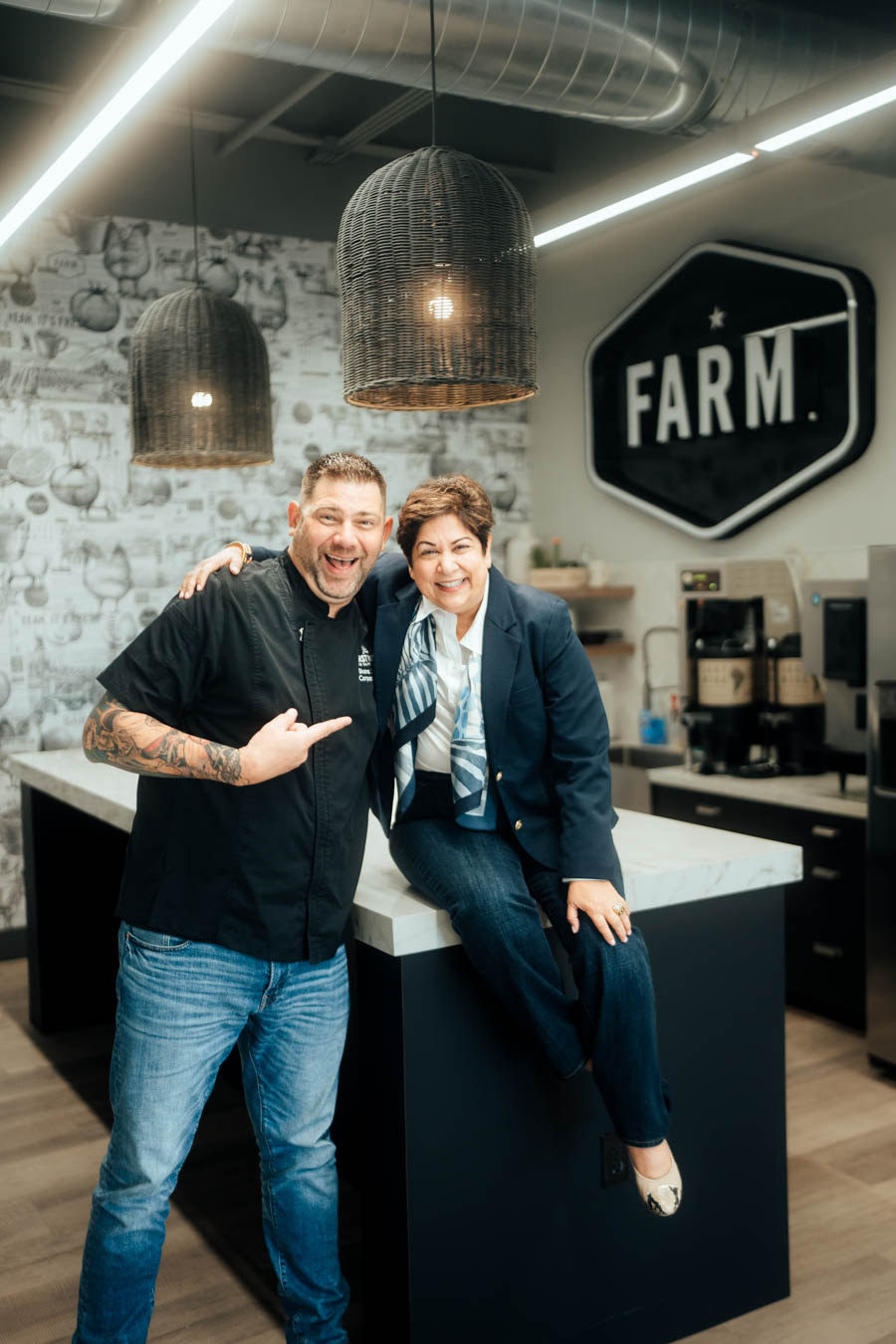First Watch
First Watch is a restaurant that fosters a culture centered upon putting its employees first, a belief that permeates both its customer service and business decisions. Sarasota is the home base for this business that has more than 445 restaurants in 28 states.
Share Your Origin Story.
First Watch traces its roots to Pacific Grove, California, between Monterey and Carmel-by-the-Sea, where our first restaurant opened in 1983, and Sarasota, Florida, which we have called home since 1986. Our founders John Sullivan and Ken Pendery worked together at several restaurant groups before setting out to create a place of their own, committed to launching a casual gathering spot where guests could enjoy meals made from the freshest ingredients available. From the beginning, there was another crucial part of the First Watch equation: people. Pendery and Sullivan knew too many folks in the industry who were forced to balance the grueling hours dictated by their careers against spending time with their families. They believed there was a better way, which explains why we’ve stuck to breakfast, brunch and lunch: we open at 7 am, close at 2:30 pm, and everyone can have a better quality of life.
As for the name “First Watch,” since the majority of our customers are not sailors, pirates or sea-farin’ scallywags, we seem to get this question a lot. A “first watch” is a nautical term that refers to the very first shift of the day. And if you ask us, it’s the best shift of the day.
Biggest Lessons Learned that Continue to Contribute to the Success of the Company.
Just Be Kind: Our co-founder Ken Pendery built First Watch with a few foundational principles in mind: put others before yourself, go above and beyond for the customer and for each other and – most importantly – “just be kind.” This quote personifies not only how we treat our customers but also how we care for one another as one team. From holding the door to our “You First” mission, our teams serve with care, openness and intention. You First: Over nearly four decades, First Watch has fostered a culture built on its “You First” mission, which puts people at the forefront of everything it does, a belief that permeates our organization. We put our employees first, so they, in turn, put our customers first. Living this out to us means focusing on developing our people and engaging them around a strong sense of purpose and teamwork. This starts with ensuring each of our restaurants and our Home Office are places that nurture potential, recognize kindness and foster opportunities that let people know they matter, because they do.
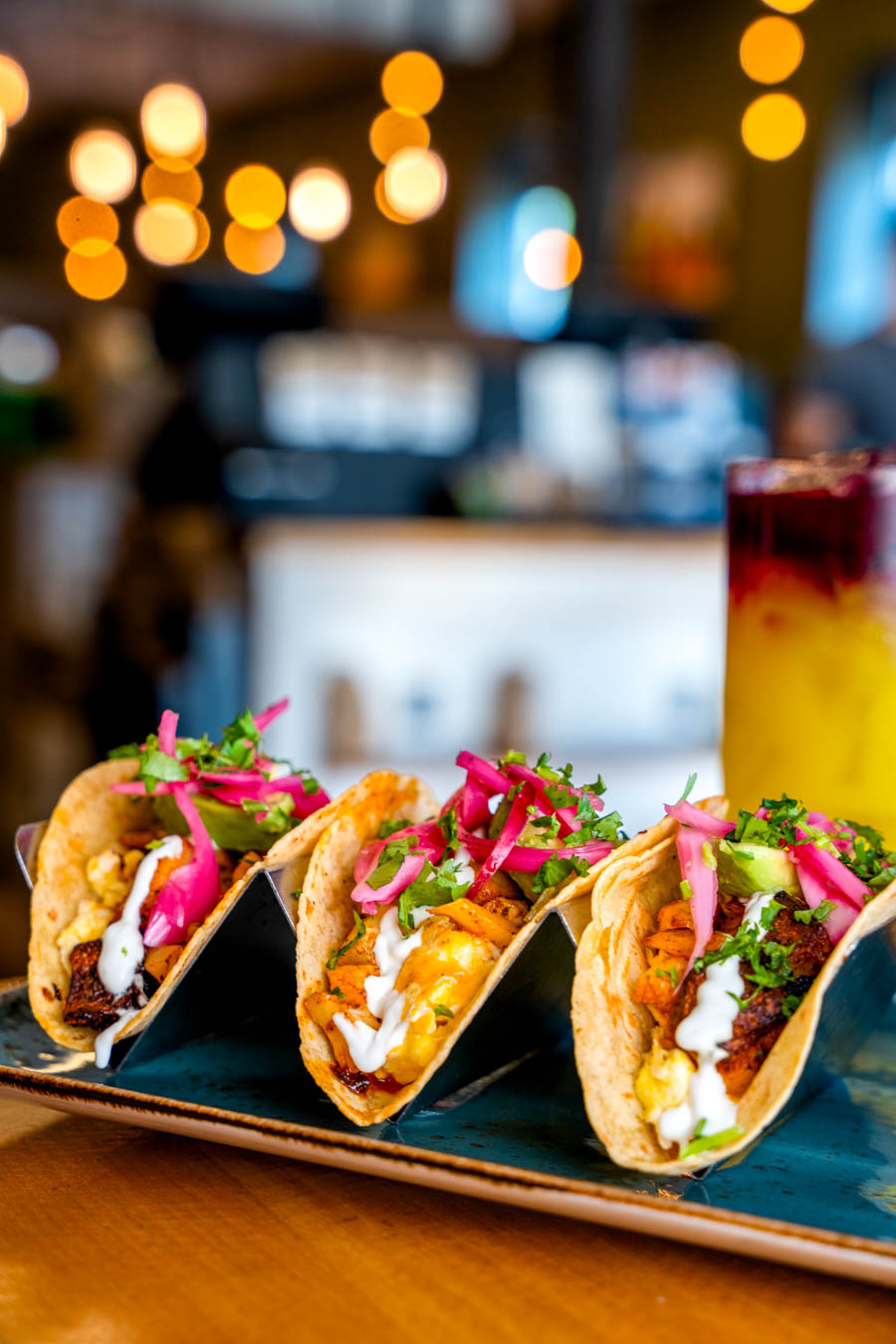
Secret Sauce
Since our founding in 1983, we have built the First Watch brand on our commitment to operational excellence, our “You First” culture and a culinary mission centered around our fresh, innovative menu that is continuously evolving. These foundational pillars have established us as the largest and fastest-growing concept in daytime dining.
First Watch is a community gathering place, and we appeal to a wide customer base who are looking for a connection and an experience, from older generations who see breakfast as a ritual to younger guests who treat the morning meal as an event and social occasion. We’ve always focused on what we do best, and we aren’t afraid to innovate, and this care and authenticity has helped build significant trust with our customers.
In fact, a recent Technomic survey in Q3 2022 showed that we’re the second most trusted restaurant brand in America. For us, it’s all about people. That’s why we operate on one-shift a day, “No Night Shifts Ever” approach, which allows our teams in every First Watch restaurant–more than 455 of them in 29 states–to enjoy evenings with their family or friends and build a quality of life that is unparalleled in our industry.
A notable example of our culture at work: we were recently named a Top 100 Most Loved Workplace® by Newsweek magazine and the Best Practice Institute–ranking as one of only four other restaurant companies to make the list. This came about because our 11,000 team members across the country shared their voice in an anonymous survey and recognized us for exceptional employee satisfaction and happiness at work. Being nominated as a Newsweek’s Most Loved Workplace alone is an honor, but to be named within the Top 100 just further reflects the incredible grit and grace our teams bring to the table every day.
The Experience | Creative Process of Developing, Honing and Evolving the Product Line?
We’re continuously innovating and evolving our chef-driven menu to craft an elevated approach to traditional breakfast, brunch and lunch and push culinary boundaries. So when we say, “Yeah, it’s fresh,” we mean it: we follow the sun to uncover the highest quality ingredients and flavors possible, wherever and whenever they are in season, made to order in a kitchen without microwaves, heat lamps or deep fryers.
With this “follow the sun” philosophy and freshness as a guiding principle, we’re adding new seasonal menu items every ten weeks–five times a year–to bring new, innovative ingredients and dishes to our customers. That’s why on our menu you’ll find vibrant, green California-grown asparagus in April, or the most refreshing Florida watermelon in July, or tender, sweet yellow corn from the Midwest in August.
Day to day, dish to dish, we obsess over every detail and every step. It takes time to uncover the best ingredients, to build relationships with bakers, makers and growers, and to explore the most delicious way to feature these ingredients on our menu. In this spirit, our culinary team has a keen awareness of emerging trends and immerses themselves in the marketplace through inspiration tours using tasting and educational experiences to develop a robust pipeline of exciting new recipes and menu offerings. This is how we came to source our Project Sunrise coffee from female-owned and operated farms – the Mujeres en Café (or Women in Coffee) – in Colombia and our 100% pure maple syrup from the family-owned Sugarman of Vermont, among many other partnerships.
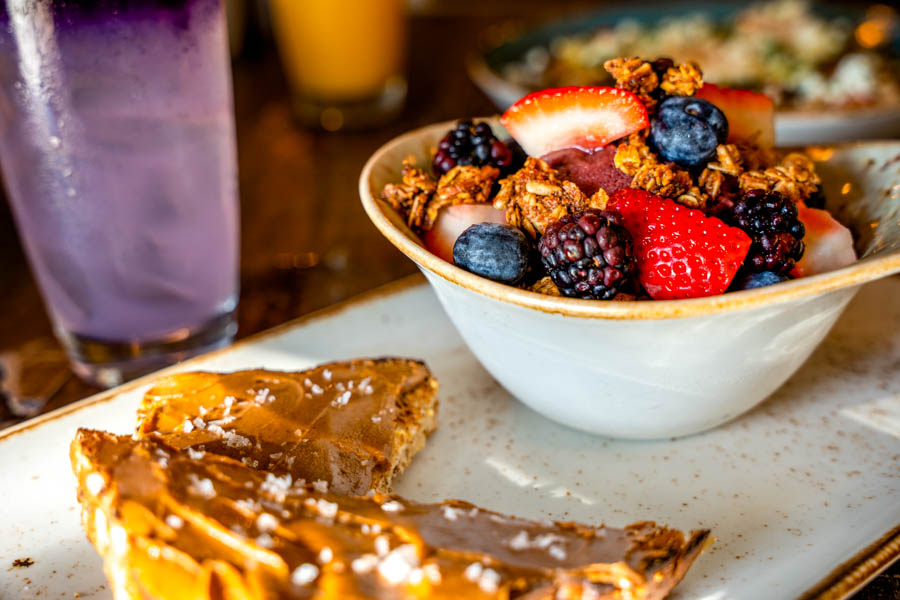
In three words, First Watch is: Making Days Brighter.
Ingredient That Most Defines First Watch? Avocados.
What made Sarasota a great place to grow First Watch?
For decades, First Watch has had the distinct privilege and pleasure of calling the Suncoast our home. We’ve led our operations out of Manatee and Sarasota Counties since we moved to Florida in 1986, when we opened our first Sunshine State restaurant in South Sarasota on South Tamiami Trail, which still serves the local community seven days a week. We then opened our second local restaurant later that year in downtown Sarasota, which was also home to the original corporate office – a 250-square-foot back room with two desks that has since been transformed into a space for private meetings and food photoshoots.
Just last year in July 2021, we opened the doors to our new corporate headquarters in the University Town Center area, located just off Cooper Creek Boulevard at 8725 Pendery Place, a street named for our co-founder and former CEO, Ken Pendery. Built by Benderson Development, our two-story Home Office serves as the base for more than 100 employees who support our national operations. And, to further expand on our “You First” culture, our office features a state-of-the-art fitness center, high-tech training room and recreational area, culinary suite, an employee café and several wellness rooms.
Our location along the Suncoast attracts people who are looking for a change of pace, away from big cities, and are attracted to everything this area has to offer–from award-winning beaches to arts and cultural attractions to an overall better quality of life in the sun.
From 7 a.m. until 2:30 p.m. at 455 locations across 29 states, thousands of people experience daytime dining at its best. It’s an experience that starts near the Sarasota-Bradenton border, just north of University near the highway. It’s an experience that has been meticulously refined, evolved and improved over 35 years. It’s the experience of dining at a First Watch. When the company moved its headquarters here from California in 1986, few would have predicted its steady rise that includes more than 110 Florida locations. So, how do you turn eggs, pancakes, avocado toast and kale tonic into one of Sarasota’s few publicly traded companies—one that employs 11,000 people nationwide and posted $235.2 million in national sales in third quarter 2022 alone?
They do it with the way they treat their customers. There’s a reason why First Watch servers open the door for you and greet you with a smile and a “Good morning.” They do it with the way they source their ingredients and prepare their food. Price is never the determining factor. They do it by creating a corporate culture that shows up in every interaction you have with hosts, servers, food runners and bussers. And for First Watch president and CEO Chris Tomasso, who has held the title since 2018, this culture is a reflection of the Sarasota-Bradenton area itself.
“It’s in our blood,” he says of the area. “When the two founders moved their families here in ‘86, there was no corporate office. They sat in the back room behind the restaurant on Main Street. That was the corporate office.” Tomasso sees the area as a great place to raise families and an easy draw for attracting out-of-town talent. And while First Watch faces the same issues around affordable housing for its employees that other businesses here and nationwide are facing, he’s optimistic and proactive, involving himself in civic organizations like the Sarasota and Bradenton Economic Development corporations.
“When people think about First Watch and what we’re about,” Tomasso says, “they know where we’re based, and in our case it’s good because we take on the personality of where we’re based. This is a place where people love to come and get away, and that’s kind of what brunch is about. We’ve loved being here.” But no restaurant can maintain staying power without a quality product on the plate. That’s where Lilah Rippett and Shane Schaibly come in. They serve as senior vice president of supply chain and senior vice president of culinary strategy, respectively.
For Rippett, a quality product on the plate starts with finding providers (or “food makers” as she likes to call them) who not only make great syrup, for example, but also whose company culture mirrors that of First Watch. That’s not always easy as the company prefers to use a “follow the sun” strategy to source the freshest produce possible. For example, at the beginning of summer, all of its watermelon comes from Florida. By the end of summer, they may be sourcing watermelon from the Carolinas.
When Rippett joined the company, First Watch was using a more traditional brand of syrup that you might find in a grocery store. She sought to find a new partner and, through an exhaustive 18-month search for what she calls “the pure stuff,” found one in Sugarman of Vermont. It’s a small detail — after all, it’s just syrup — but the details matter to this company.
“Where Mother Nature takes us, that’s where we will go and play,” Rippett says. “It’s the best quality. It’s easier for us to make sure we’re getting safe, good, number-one quality for our consumers.” Visiting suppliers, Rippett and Schaibly travel fairly regularly, and when they do, they’re eating at local breakfast restaurants around the country, they’re understanding trends and shifts in consumer habits. This helps the team come up with new ideas as it switches out its seasonal menu every 10 weeks. So, how do you create a menu that needs to appeal to a diverse set of diners from Florida to New Jersey, Illinois to Arizona? That task falls on Schaibly.
The company tests every new product in a handful of its Tampa locations, but before it gets there, the culinary team holds a brainstorming session where he says the team “dumps out all the ideas that we’ve been accumulating over the last six months.” It may start with ingredients like pumpkin and squash in the fall, or shrimp and crab in the summertime.
“We talk about the fruits and vegetables that are growing and are perfectly ripe during that season,” Schaibly says. “We talk about the proteins that would play well, and then we think about the dishes that have had great success for us in the past.”
From there, it’s a matter of combining ingredients into dishes. They’re figuring out if pork and green chiles would work better as a hash, breakfast burrito or a benedict (clearly a hash). They’re not inventing anything new, but they’re innovating in the way they balance those two golden words: creative process. Finding that balance between the creative side of things and the process side is one of Schaibly’s strengths, according to Rippett. “As a chef, his left brain and right brain are so balanced that that helps us to get to go faster,” she says.
Let’s face it. Chefs’ ambitions can get the better of them. Ideas that are wild and experimental may fly at independent restaurants, but scaling them is a different story. “I want all of those ridiculous things, but I also understand the reality of doing that in 500 restaurants,” Schaibly says. I take a lot of pride in being able to pick out what we think is going to be a trend and find out if those things can be done at scale.”
The company is proud of the ways they give back. Whether it’s supporting Mujeres en Café (or Women in Coffee) in Huila, Colombia, supporting local celebrity (and Lakewood Ranch First Watch regular) Dick Vitale’s work with the V Foundation, or donating millions to No Kid Hungry, the company takes the idea of service to a whole other level.
With the company’s current approach, Tomasso believes it can grow to 2,200 restaurants nationwide and still maintain the level of excellence that has helped it succeed to this point. And as for that beautiful building near the highway that First Watch calls its corporate headquarters, the company is already starting to outgrow it. “I’m really excited about what the future holds,” Tomasso says. And with so much opportunity (and avocado toast) on the horizon, how could you not be? — Kevin Allen
How First Watch Chooses Its Suppliers
Rippett says choosing a supplier is about much more than price. It’s the quality of their product and their corporate culture. Some of the questions she’s asking include, “Does their culture match our culture? Are we on the same page? What are they thinking about? How are they coaching and training their teams? Is it the same way we do ours? Are our philosophies matched up?” Rippett recalls an instance where company cultures did not align. When visiting a prospective supplier, she noticed the company’s break room was dark and dingy with light bulbs burnt out. Employees were trying to eat their lunches in the dark. She remembers thinking, “This isn’t gonna work. We’re not aligned. This is not how you treat people.”
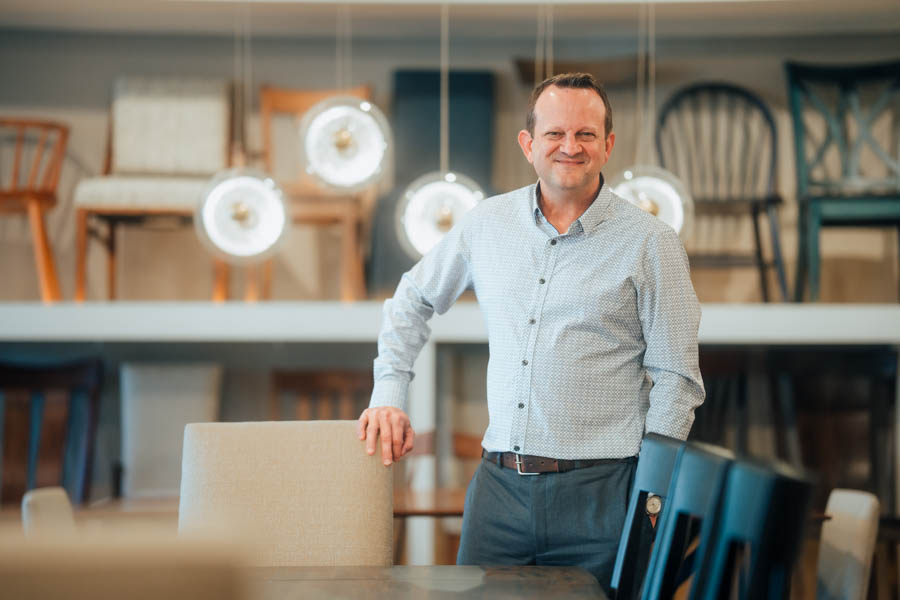
DUTCH CRAFTERS
DutchCrafters is the leading retailer of Amish-made furniture, selling online and in their Sarasota and Alpharetta showrooms. The company is known as the destination for solid wood, American-made, Amish furniture that is aligned both with their customers’ styles and values.
Share your origin story.
In November 2002, JMX Brands CEO Jim Miller and CIO Miao Xue, former classmates at the University of South Florida graduate program in organizational management, began sharing their aspirations to start a business together. In early 2003, while lunching at a popular Sarasota café, they agreed to proceed with an ecommerce firm, merging the initials of their names to create JMX.
They knew that they wanted to sell products online but didn’t initially know what they wanted to sell. Miao was responsible for developing the technical infrastructure for the ecommerce sites. Jim was responsible for finding the products to sell. As Jim started to identify products, Miao gave him some advice: seek out products related to what you know and love.
Drawing on his Mennonite background, Jim traveled with his wife, Linse, along country roads through pastoral landscapes of Pennsylvania, Ohio and Indiana, searching for quality Amish-made furniture and crafts. Jim and Linse observed firsthand the products’ unparalleled quality and appeal. Their interactions with skilled artisans and woodshop owners laid the foundation for
building a new kind of team. Because Jim and Linse were familiar with Amish culture and traditions, they understood how to collaborate cooperatively with Amish vendors. Initially, some skepticism was noted, but Linse and Jim believed in the potential and accepted the challenges for what seemed to others an unlikely pairing—Amish woodworkers and the internet. With the development of dutchcrafters.com, JMX Brands became a disruptor in the field, being one of the first companies to sell Amish-made products online.Delivering excellence was the goal from the beginning.
On Growing National
With its beginnings in 2003, JMX Brands
is celebrating its 20th anniversary this year. This is a milestone that many companies do not make. Still, if comparing to human development, the company is only now entering its adult years. As a company that continues to innovate, its culture is one of entrepreneurship with the feeling of constant growth and change. Its growth
can be described in revenue and company size as well as local to national.
Toddler Years
The company started as a true start-up, with Jim’s initial investment of $1,000 and offices in Jim and Linse’s living room. As an ecommerce business, the company started selling nationwide immediately. Focus during the early years was on establishing relationships with vendors, optimizing the websites to be found on search engines, managing the complications of shipping Amish products nationwide, especially since Amish woodworkers do not package their furniture and most of it needs to be delivered by specialty shippers who blanket wrap, and establishing a core group of employees that could manage multiple tasks as the company scaled up revenue. JMX Brands hired its first employee in 2004, with revenues over $500,000 that year. The company focused on Amish-made products but sold a variety of other niche products as well.
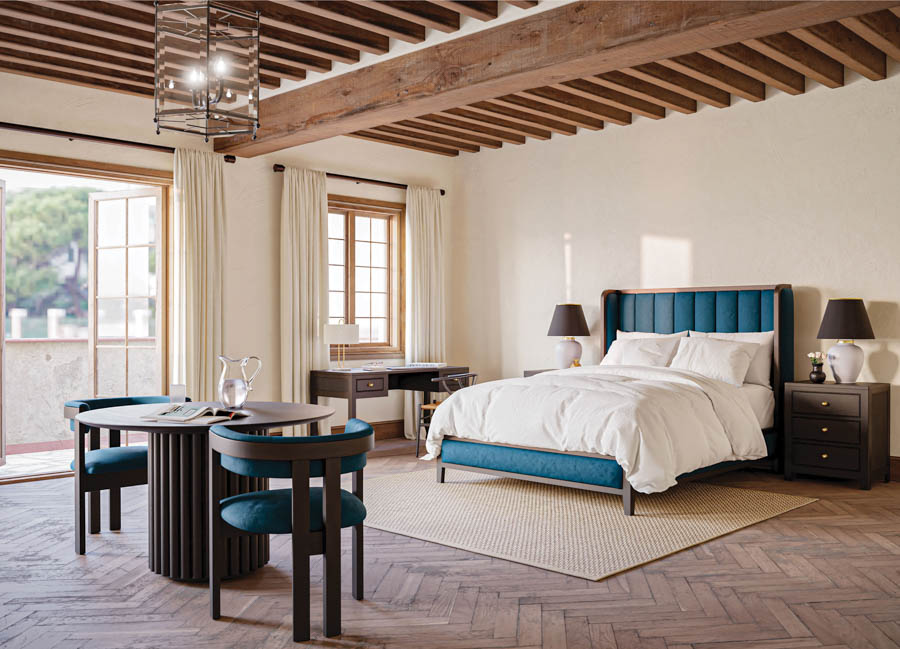
Teenage Years
As the internet developed and matured, JMX Brands lasered its focus to its DutchCrafters brand at dutchcrafters.com. DutchCrafters sold Amish-made products, mostly furniture that customers could customize with wood type, finish and hardware options. The furniture was built to the customer’s specifications after the order was placed and shipped directly to their home. This brought one-of-a-kind, heirloom-quality, solid-wood furniture to anyone in the United States. The company weathered the ups and downs of Google algorithm changes, such as the Panda and Penguin updates, which wreaked havoc for companies relying on Google search placements for their business. The company expanded its advertising activities and professionalized its SEO. This brought steady revenue growth for several years and put the company on the Inc. 5000 list for six years and the Gulf Coast 500 list for seven years. In 2013, the company saw 100% growth over 2012. By 2015, the company had revenues of $7.8 million annually and was renting extra office space for its growing team of employees.
Adult Years
Though an ecommerce business for more than 10 years, Jim and Linse saw the potential in moving from “clicks to bricks” and had long dreamed of opening a brick-and-mortar store that could serve customers seeking the personalized experience of in person shopping with access to the many products on the website. In 2015, the company purchased a property at 3709 N. Lockwood Ridge Road in Sarasota with retail space on the first floor and office space for the headquarters on the second floor. This expanded the company from solely ecommerce to a multi-channel company, but also changed some focus from nationwide to local to promote the store to the local community. The success of the Sarasota Showroom led to opening a warehouse and outlet store in LaGrange, Indiana in 2020 and another showroom in Alpharetta, Georgia in 2022. Another expansion was in deliveries. JMX Brands had long partnered with specialty shippers that blanket wrap and deliver Amish-made products. To control costs and enhance the customer experience, the company added an in-house delivery team in 2020, which has expanded to four trucks and six drivers.
Mid-Life Crisis
The most significant mid-life crisis for the company occurred with the pandemic. In the matter of a couple of days, the company moved its entire staff from working in the office to working from home, closed the Sarasota Showroom and adjusted to remote work. As a company based in technology, the transition to remote work went smoothly. The company then prepared for what looked like what would be an economic downturn. Instead, it experienced the opposite challenge. The internet became the primary location to shop, and people were spending much more time in their homes. Shopping online to freshen up the space that had become their refuge brought many customers to DutchCrafters, due to its high Google search placements. Sales skyrocketed and company staff scrambled to manage the workload while handling the personal challenges of the pandemic. JMX employees hired remotely, trained remotely, and tried to stay connected remotely. They stayed focused on providing the best service for their customers even while woodshops struggled to stay open and supply chains were disrupted. The company ended 2020 with $18.1 million in revenue, up 53% over 2019. 2021 produced $23.8 million in revenue.
Golden Years
In 2023, JMX Brands is celebrating its 20th anniversary. The company’s employees are focusing on their vision to provide exceptional customer experience. They plan to open another DutchCrafters Showroom in 2023, continuing to expand the destination showrooms to other areas in the country. They also plan to give additional attention to their other brand, Eco Friendly Digs at ecofriendlydigs.com, which sells high-quality sustainable home furnishings.

Secret Sauce
The Secret Sauce for JMX Brands combines several unique gifts, bringing to the table a new kind of team and new formula for successfully becoming a disruptor in the field of marketing Amish-made products online. Starting out with their share of doubts about offering the ecommerce model to Amish woodworkers, Jim and Linse accepted the challenge and leaned into their goals. If it were easy, everyone would be doing it. They carved out their niche, undaunted by naysayers who could not envision the unlikely partnerships leading to success. Jim and Linse were familiar with the Amish/Mennonite culture, traditions, work ethic and the high quality of the artistry seen in the products created. That background continues to be a major ingredient in the Secret Sauce of JMX Brands. They have been able to bridge the gap between low-technology Amish communication and ecommerce.
Sustainability is another vital ingredient in JMX Brands’ Special Sauce. Jim and Linse share with many woodworkers a reverence for the forests and a commitment to the sustainable harvesting of fine hardwoods. DutchCrafters pays for a new tree to be planted in America for every order placed. The objective is to keep the forests growing along with the business. JMX Brands’ positive corporate culture drives the business forward with plenty of staff encouragement, recognition, rewards and awards for demonstrated achievements. The company gives out two awards each quarter for staff who exemplify the company’s values or made an achievement that has had a positive effect on the company’s bottom line. There is an annual awards ceremony where a number of awards are given. The company schedules a Spirit Day each month to celebrate company culture. Ongoing support for continued learning and growth sharpens skills across all teams.
In three words, Dutchcrafters is: Innovative. Authentic. Sustainable.
Ingredient that Most Defines Us? Heirloom-quality hand-picked products with exceptional service.
What made Sarasota a great place to grow JMX Brands?
Sarasota, which is the headquarters of JMX Brands, has a been welcoming and successful place to start and grow this ecommerce business. The picturesque, sunlit location by the sea, with plenty of arts, entertainment and year-round outdoor activities, attracts visitors and residents from all over the world. The desirable setting provides a talented employee pool. From the beginning, supportive agencies such as The Greater Sarasota Chamber of Commerce, Manatee Chamber of Commerce and the Sarasota County Economic Development Corporation have been wise and welcoming advisors and business partners for the JMX Brands team. Niche retailer JMX Brands sells more than 15,000 products on a variety of websites, including its flagship Amish furniture site. It also has DutchCrafters Showrooms in Sarasota, FL and Alpharetta, GA and an outlet store in LaGrange, IN. JMX Brands was a 2016 Florida Company to Watch and the Greater Sarasota Chamber of Commerce’s 2017 Retail Business of the Year and 2021 Medium Business of the Year. Recent growth JMX Brands has achieved since its founding includes being named one of the Top Places to Work in Sarasota-Manatee for 2020, 2021 and 2022, and Best Places to Work by Furniture Today magazine for 2021 and 2022.
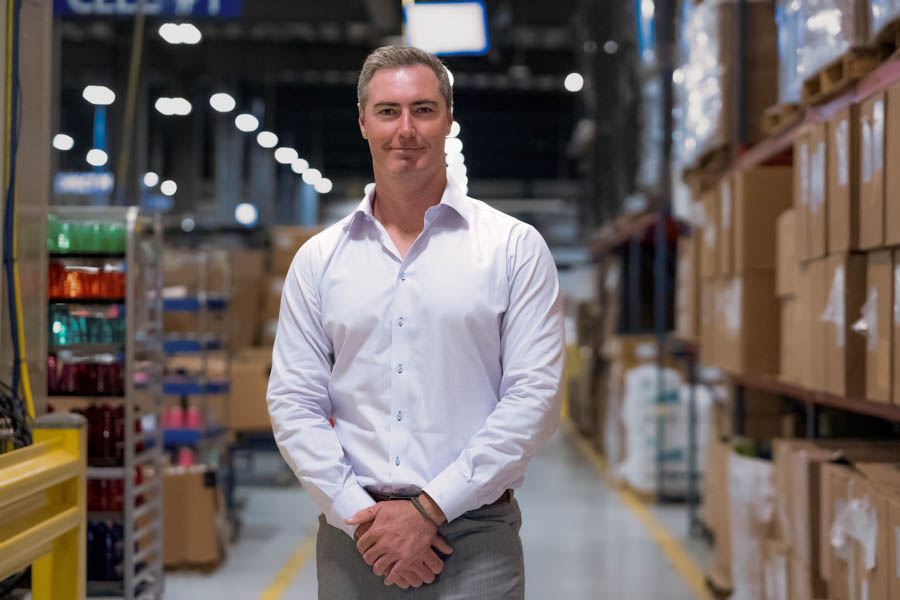
Tervis Tumbler
Tervis is a third-generation American-owned-and-operated company, renowned for the durable construction of its drinkware, the timelessness of its decorations and designs and the insulation qualities which have stood the test of time.
Share Your Origin Story.
It all began with Jake Winslow. Entrepreneur John C. “Jake” Winslow (c1914-1983) loved the outdoors. He made a name for himself supplying outdoor leisure lovers with marine, hunting, and sporting goods. He knew firsthand how hard it was to keep drinks cold and hands dry while enjoying leisure activities in the sun. He sought a solution to this problem to benefit boaters, golfers, tennis players and others like him who valued their well-earned leisure time. He discovered the work of Frank Cotter and G. Howlett Davis, who in 1946 created the world’s first permanently sealed, double-walled, insulated tumbler. Combining syllables of their last names, the two engineers called this dependable, leisure-friendly drinkware “Tervis.” Winslow purchased the rights to this revolutionary drinkware and began manufacturing it in Florida in 1967, selling tumblers from dock to dock, from fairway to fairway, and in outlet stores connected to the Tervis manufacturing facilities. In his over two decades at the helm, Jake Winslow made Tervis tumblers a beloved part of the Florida coastal experience by focusing on three things: high quality, customization options and a lifetime guarantee.
Fun Fact
As a “teenage” company, we used pizza ovens to heat materials prior to molding the insulated layers needed to keep drinks cold (or hot) and hands dry. Today, proprietary ultrasonic welding techniques permanently seal our classic tumblers and water bottles.
The Next Generation: Unprecedented Growth
A few years after Winslow’s passing, his widow Mary Alice Amory Winslow approached her son-in-law Norbert Donelly and asked if he’d be interested in helping out for a few weeks. Those few weeks marked the transition of Tervis to second-generation leadership. To his father-in-law’s foundation of “quality, customization and a lifetime guarantee,” Donelly added another promise: rapid delivery. He instilled a sense of trust among employees, encouraged creative thinking, accepted intelligent failures, and always recognized achievement and innovation. Those four precepts, a talent for hiring the right people into the right positions and a strong company culture led to unprecedented growth for the company: When Donelly began his tenure at Tervis, the company employed 20 people and sold tumblers in three Florida outlet stores; when he stepped down in 2016 to pass the company’s leadership to his son, Tervis employed hundreds, operated multiple branded retail locations and had shelf space in the country’s best-known sporting goods and specialty stores, and high-end hotels and resorts. Of his time leading the company, Norbert said “I never worked to build the biggest company, just the best, our growth was the organic result of that.”
A ‘Midlife Crisis’ Averted
Rogan Donelly (Norbert’s son and Jake’s grandson) literally grew up in the business. As he says, “At home, I’d hear about Tervis from breakfast to dinnertime and as a kid I never knew anyone else made drinkware!” His childhood handprint was even memorialized in the concrete of the Osprey, FL Tervis store. When he was officially named president in 2016, the company that his grandfather built around an innovative product, and that his father grew through adept management and expanded distribution, faced a new challenge, a potential “midlife crisis”: Customers wanted more options for on-the-go hydration. Rogan was up for the challenge, spearheading the introduction of a stainless steel product line to accompany our iconic classic tumbler and water bottle. In his words, “We put the Tervis touch on stainless steel: high-quality standards, hundreds of designs and customization options and quick delivery... resulting in triple-insulated stainless steel tumblers and water bottles with the best decoration capabilities on the market.” Having averted a “crisis” and expanded the Tervis portfolio of products, today, Rogan leads a company beloved for decades as a classic American leisure brand. And it all began with the vision of John C. “Jake” Winslow, whose spirit and legacy live on through the brand.
The Golden Years Are Just Beginning
From an infant business born of one man’s vision to a national presence known for quality and innovation, Tervis today is a third-generation American-owned- and-operated company, renowned for the durable construction of its drinkware, the timelessness of its decorations and designs and the insulation qualities which have stood the test of time. And we believe that our “golden years” are just beginning. We are proud to be a solid player in the industry that started when the first Tervis tumbler was made in 1946, and we will continue to listen to consumers so that we can provide solutions with our innovative drinkware further into (and hopefully beyond!) the 21st century. Our goal is to produce insulated drinkware that meets the ever-evolving needs of our customers so that when the next round of consumer needs is identified, we are already there with a product to meet them. We started 2023 by launching new Traveler Tumblers made with our trademarked DuraPrint™ technology, and we will continue to develop features that bring the most benefits to our customers – for this generation and the next.
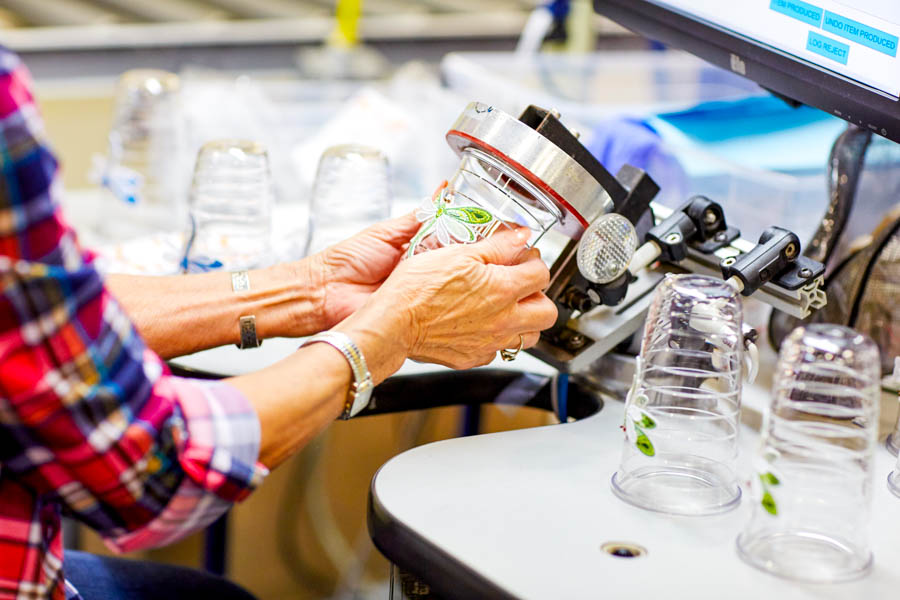
Secret Sauce
It’s like the famous, funny, fast food meme that says, “Our secret ingredient is our people.” But when we say it, it’s not a joke about what’s in your burger; it’s a proven element of our success. The Winslow-Donelly family has created an enviable work environment, one which makes people excited to apply, thrilled to be hired and engaged while working.
How We Drive the Product Line Our recipe for designing, honing and evolving the line is simple and straightforward: it starts and ends with the consumer. We identify who they are and what they want and need in a product. Next, we innovate to ensure meeting those needs and wants as they evolve.
In three words, Tervis is Made to last.
A Perfect Fit
The Sarasota area is a perfect fit for Tervis because its literal climate (as well as its spirit) suits our classic American leisure brand. A Tervis tumbler represents a day on the water, a gathering with friends and family, sun and sand and surf, a well-earned day of golf. The Sunshine State has an infrastructure and business environment that is highly conducive to a business like ours.
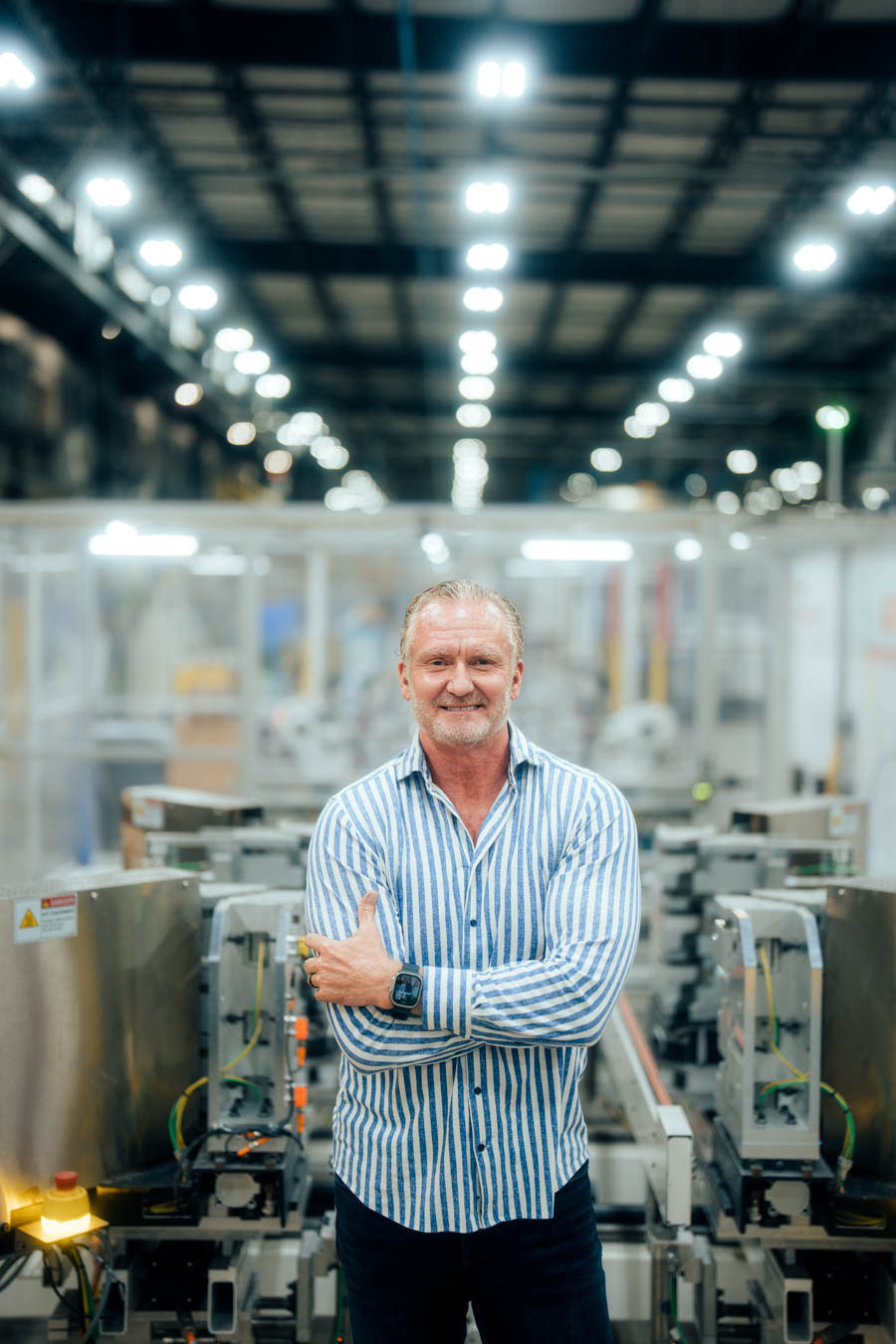
PGTI
For nearly 40 years, PGTI has been driven to create the strongest, safest building products on the market, with a resolute focus on always putting the customer first. Throughout the years, they’ve developed a community centered around integrity, safety, innovation and sustainable growth.
Share Your Origin Story..
PGT Innovations manufactures and supplies premium windows, doors and garage doors and we hold the leadership position in our primary market. PGTI’s story started in 1980 when our founders Paul Hostetler and Rod Hershberger drew a vinyl porch enclosure product on a napkin. Shortly after, the two opened the VinylTech business in Venice, FL and began producing that product with three employees. That product is still sold today as PGTI’s Eze-Breeze brand. From the very beginning of PGT Innovations, our team has strongly believed in keeping its promises to customers no matter what. Around the company’s fourth year, a customer’s order didn’t make it on the delivery truck, and VinylTech was going to have its first ever backorder. Demonstrating VinylTech’s dedication to serving its customers and keeping its word, Rod and Paul hired a plane and had the order flown across the state to ensure the products arrived on the day they promised.
Another memorable story from the early days was when one of our delivery driver’s trucks broke down with three deliveries left for the day. Our team member called a tow truck company, but before having his truck towed back to the manufacturing plant for repairs, he asked the tow truck driver to tow the disabled delivery truck to the rest of the locations on his route so he could deliver the products on-time to our customers. Today, PGT Innovations trades on the NYSE, employs approximately 5,600 team members across the U.S., produces hundreds of products that unify indoor and outdoor living spaces, and has a legacy of being the leading impact-resistant window and door manufacturer in the nation.
Toddler Years
After being in business for a few years and consistently demonstrating our commitment to customers by going above and beyond to meet delivery deadlines, VinylTech grew substantially, requiring us to expand our operations to a larger facility and subsequently open a second facility. Recognizing the growing need within the Florida market for a reliable window supplier, VinylTech established a new division within the company known as Progressive Glass Technology (PGT) to manufacture windows and doors.
Teenage Years
For two years following the destruction of Hurricane Andrew in 1992, our PGT team demonstrated our commitment to serving our industry by working with Miami-Dade County building officials to establish a tougher South Florida Building Code. This code improved roofing standards, mandated impact-resistant windows, doors, and hurricane shutters and would later go on to be adopted statewide in 2002 as the Florida Building Code. Shortly after our collaborative work on the building code, PGT launched its first aluminum impact-resistant window in 1994, providing weather, intruder and sound protection to homeowners and establishing our company’s reputation as a leader in the window and door industry.From there, PGT experienced substantial growth that allowed us to build a new headquarters and manufacturing facility in North Venice in 1995, where we celebrated 15 years of service with our 650 team members.
Adult Years
As PGT continued to grow, our team recognized the need to have more control over the window production process, so we added our first glass plant to our North Venice location. Over the next several years, PGT underwent great transformation, as co-founder Paul Hostetler retired and Rod Hershberger was promoted to President and Chief Executive Officer. PGT’s ownership also moved between two private equity firms, allowing us to experience substantial growth. With the focus of moving PGT to the next level, Rod Hershberger (CEO), Jeff Jackson (CFO) and Debbie LaPinska (VP of Sales & Marketing) completed a three-week road show and took PGT Industries public on the NASDAQ stock exchange as PGTI at $14.00 per share. We continued strengthening our industry leader position when PGT launched WinGuard® Vinyl – our company’s first line of vinyl impact window and door products.
Mid-Life Crisis
After surviving the Great Housing Recession from 2008 to 2012, big changes started happening within PGT around the 23-year mark. PGT became a fully independent publicly traded company when JLL Partners divested its 6,300,000 shares of PGTI stock. Jeff Jackson was promoted to president and chief operating officer, marking the beginning of our company’s leadership succession. It was at this time we began our acquisition growth strategy. PGT acquired CGI, combining two successful companies committed to serving the impact-resistant window and door industry and further advancing our leadership position in our industry. In that same year, we added a second glass facility to our North Venice campus, expanding our glass cutting, tempering and laminating processes and boosting quality control. Over the next two years, we continued our growth through acquisitions. In 2016, PGT acquired WinDoor, diversifying and broadening our brand and product portfolio with the addition of the luxury brand. On the heels of that acquisition, we acquired U.S. Impact (later renamed CGI Commercial and structured as a division of the CGI brand), supporting our expansion into the commercial market by adding capabilities such as fabricating and glazing window and door frames for commercial products.
The Golden Years
In 2018, Rod Hershberger retired, and Jeff Jackson was promoted to President and Chief Executive Officer with the focus of continuing our company’s legacy of deep customer relationships and accelerating the innovation that PGTI’s customers need and expect. With innovation at the heart of our company’s mission, PGT Industries changed our name to PGT Innovations (PGTI) and was established as a parent company. At that time, the PGT Innovations family of brands included CGI, PGT and WinDoor. As a reflection of the changes being made within our organization to expand opportunities for growth and increase value for shareholders, PGTI moved from NASDAQ to NYSE. Supporting our company’s strategic initiative to attract talented, hardworking leaders and offer benefits to help team members succeed, the PGT Innovations Leading Ladies program was created to empower the women of PGTI through mentorship to learn, encourage and celebrate accomplishments. We also established our “Inspire the Future” Scholarship Program to provide secondary education funds to the dependents of our team members.
Secret Sauce
The company culture necessary to make that happen is about togetherness. We know that to achieve greatness, we need to work as a team with an outward mindset. Every day, we look for opportunities to grow and achieve greatness together. This isn’t an “everyone for themselves” environment. We look out for each other. We help each other. We prop each other up during challenging times because inventing, building and delivering the future of building products is not a one-person job. It takes all of us. Our collaborative group. Our understanding family. Our strong team. Working together to inspire greater opportunity for our customers, our community, and our team members.
In three words, PGTI is Serving. Leading. Thriving.
Our Defining Ingredient is Family.
What made Sarasota a great place to grow your business?
The company’s strong roots here derive from a solid business environment in Sarasota County and a quality of life that is unlike any other location. Operating in Florida and Sarasota provides our firm with a favorable and pro-business atmosphere that allows us to thrive with community support and a robust labor force. Besides all that, we live in paradise! From the weather to the top-rated schools to the world-class beaches and abundant amenities for people of all ages, there is no place we would rather operate our corporate headquarters.




